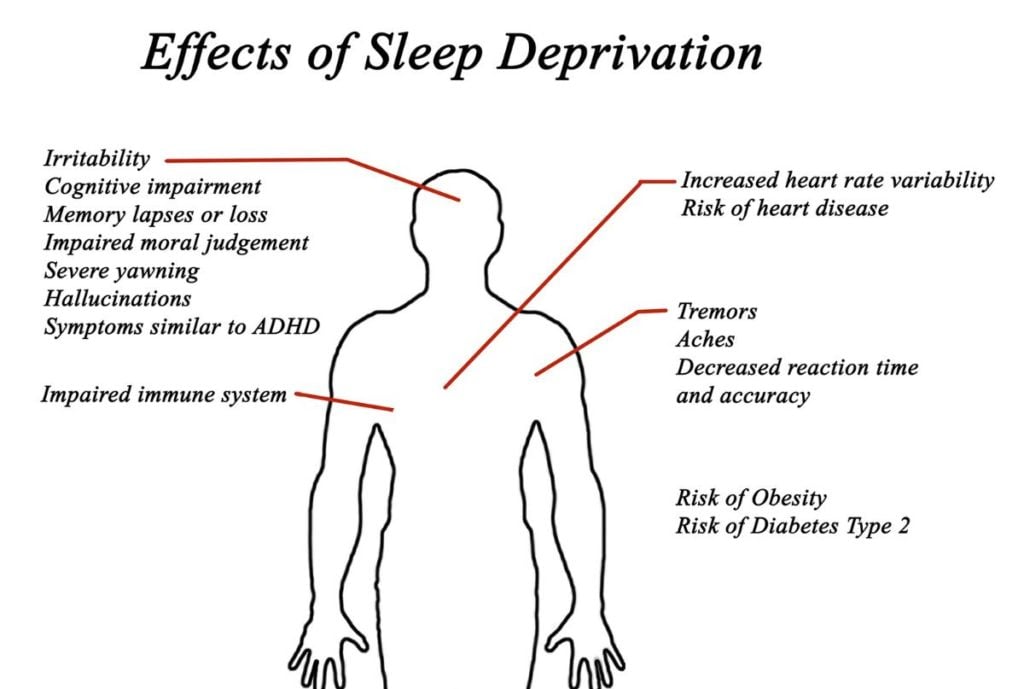
A well-known study undertaken over a decade ago showed that a rat prevented from sleeping would die in about three weeks, losing the ability to maintain body heat and develop a fever to stave off infection.
In humans, fatal familial insomnia, a degenerative brain disease, leads to death after several months. While this disease is extremely rare, lack of sleep can cause health problems and dramatically affect the quality of life.
To achieve optimum performance, people need good quality sleep. Impaired sleep reduces performance on many mental tasks.
Less sleep lowers IQ scores
According to Coren, scores on intelligence tests decline cumulatively on each successive day you sleep less than you usually sleep. The daily decline is approximately one IQ point for the first hour of sleep loss, two for the next, and four for the next. After five successive days of sleeping less than you need, your IQ can be lowered by up to 15 points.
This means that a person of average intelligence could have an effective IQ of only 85, the level at which you would need special education to learn. Even a very ‘bright’ person (IQ of 120 plus) can be reduced to robotic thinking, as though on automatic pilot.
Sleep deprivation linked to poorer grades
Research has also revealed an association between sleep deprivation and poorer grades.
In a survey of more than 3,000 high-school students, psychologists Amy R. Wolfson, Ph.D., of the College of the Holy Cross, and Mary A. Carskadon, Ph.D., of Brown University Medical School, found that students who reported that they were getting C’s, D’s and F’s in school obtained about 25 minutes less sleep and went to bed about 40 minutes later than students who reported they were getting A’s and B’s.
Sleep deprivation linked to accidents
Sleep deprivation is a major cause of motor vehicle accidents, and it can impair the human brain as much as alcohol can. Coren tested drivers after they had been awake for one hour beyond their ‘normal’ bedtime. Their thinking processes and reaction times were worse than a control group who had drunk more than the UK drink/drive limit for alcohol consumption.
Mitler’s studies of catastrophes, such as the Three Mile Island nuclear power accident, and the Challenger space shuttle explosion, concluded that poor sleep quality had impaired decision-making and contributed to each catastrophe.
Sleep deprivation affects your health
Beyond leaving people bleary-eyed, clutching a Starbucks cup, and dozing off at afternoon meetings, failing to get enough sleep heightens the risk for a variety of major illnesses, including cancer, heart disease, diabetes, and obesity, studies indicate.
Research from scientists in Japan suggests insufficient sleep increases the chance of breast cancer. The findings, published in the British Journal of Cancer, state that women need at least six hours of sleep a night. Without this, their chances of breast cancer increase by up to 60 percent.
Studies have also demonstrated that reduced sleep quantity can impair glucose metabolism and appetite regulation resulting in an increased risk of obesity and diabetes.
People sleep less than a century ago
Sleep deprivation has become one of the most pervasive health problems facing the United States, states the website Sleepdex.org. It is estimated that people, on average, now sleep one and a half hours less than people did a century ago. In a “Sleep in America” poll of 1,000 adults, nearly a third said they need at least eight hours to avoid feeling sleepy the next day. However, the respondents responded that they average 6.9 hours of sleep on weeknights and 7.5 on weekend nights.
Griffey claims that, in the UK, in 1910, people averaged nine hours of sleep a night. In 1990, this average was eight hours of sleep a night. By 1995, according to a survey by First Direct, people in the UK were averaging seven hours and 35 minutes of sleep a night. By 2004, the average had fallen to seven hours per night.
How much sleep does one need?
The amount of sleep that people need varies significantly from one person to another. It ranges from four to ten hours. For adults, quality sleep seems more important than quantity, say Horne and Wootton in their book Training Your Brain.
Quality sleep can be impaired by listening for a baby, the return of a missing teenager, or by fear of not hearing the alarm clock. Sleep quality can also be impaired by snoring — yours or someone else’s.
Edublox offers cognitive training and live online tutoring to students with dyslexia, dysgraphia, dyscalculia, and other learning disabilities. Our students are in the United States, Canada, Australia, and elsewhere. Book a free consultation to discuss your child’s learning needs.



